CubaDebate 174
Can the Left Win an Election?

Can the Left Win an Election Without an Organized People?
 By Hugo Moldiz Mercado.
By Hugo Moldiz Mercado.
He is a Bolivian lawyer, communicator, university professor, researcher, Master in International Relations and correspondent for international news agencies. He has advised some commissions of the Bolivian Constituent Assembly.
April 28, 2020
Translated and edited by Walter Lippmann for CubaNews.
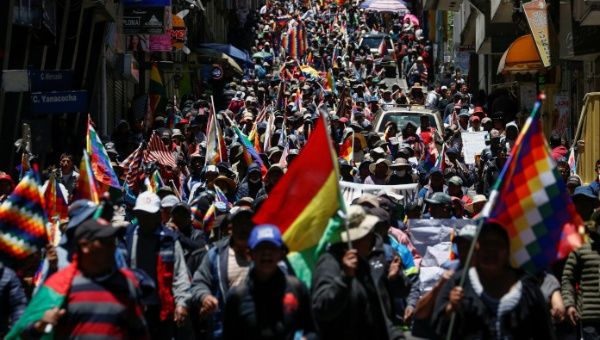
Demonstrations in La Paz protesting the coup d’état against Evo Morales. Photo: Reuters.
In what way does the left have a chance of triumphing in representative (bourgeois) democratic elections? Is it an efficient and effective electoral strategy, regardless of the relation of forces between the dominant and subordinate classes, the predominant, even the only one, for a leftist candidate to be able to attract aa high percentage of the population and crown himself as the winning formula?
Is it a general political strategy, with its political-electoral correlate, that builds “from below” a favorable relationship of forces in the social struggle, to then translate it into votes greater than those received by the right-wing candidates, leading to a political-electoral victory?
It is evident that much reflection can be made on each of the questions posed. It is even possible to incorporate other questions in the same direction and make the issue even more complex. However, at the risk of appearing too simple, let us try some criteria.
The first is that the ways of doing electoral politics depend on the general political situation of the time. There is an intimate relationship between the political characteristics of a certain general historical period and the characteristics of a specific electoral situation.
A correct electoral strategy that ignores the political features of the period and the situation, however attractive it may be in the eyes and ears of the people, will not mechanically give the expected result: triumph. On the contrary, an electoral strategy based on the people as a social force with an effective territorial presence will be capable of convincing and attracting various fractions of the petty bourgeoisie and other backward sectors of the popular camp to lean towards a leftist candidate.
Second, it is true that the conditions and tools existing in this second decade of the 21st century are different, even radically different, from the conditions and tools that the left developed and used to conquer electoral victories, first, and install governments of its ideological-political court at the end of the 20th century and the beginning of the 21st century, later.
There is no doubt that the role of the media and social networks – as ideological state apparatuses – has an increasingly greater degree of influence in the configuration of electoral results. Whether or not it is predominant depends on the type of social formation, the nature of the class confrontation at the time, and the nature of the political strategies of the actors.
But neither the first nor the second criteria (forms of electoral participation, on the one hand, and conditions and tools, on the other), modify in substance the main aspect of representative democracy. That system, on the basis of the fetish of “one citizen, one vote”, is generally structured to ensure the reproduction of the type of capitalist state in the long term.
Except for a certain relative autonomy of the State from its dominant classes, in moments of general crisis, the left can take over the government, while previously building from “below” a relationship of favorable social and political forces.
Based on these two considerations, it is good to point out that, as a general rule, the left has been the winner of electoral competitions when its electoral strategy has succeeded in establishing or expressing the trend of social availability of the subordinate classes.
In other words, to build and condense through them a present state of mind and subjectivity of a social majority that is unwilling, for various reasons, with the government of the moment, and that is inclined to change through an option would answer the current state of affairs.
It is when the general crisis or even the indisposition with the government of the moment is made to lean to the side of a popular project. In other words, it is not only the candidate’s attributes that win over most voters but, above all, when that candidate or party synthesizes the “common sense” of what the people want and what they are fighting for at that moment.
However, this “common sense” does not arise spontaneously, even more so when the majority of the state system (repressive apparatus and ideological state apparatus) are against a leftist candidacy. It is rather the result of a patient and skillful construction of relations of forces favorable to change. This requires a conscious leadership. It is when, without abandoning modern techniques of inducing people to vote, the fragmented social tissues are gradually being articulated into a single large, strong and vigorous fabric.
The right-wing options have in an otherwise always expensive election marketing campaign the predominant way to win an election. This is because the whole state apparatus (repressive and ideological) works for their benefit. But the left, even if it is reformist, is obliged to find, in the organized strength of the people, the main source of its strategy, its tactics and its tools of triumph.
Moreover, even if the left obtained an electoral victory as a result of a high level of rejection by the population of the parties of the right, due to an unprecedented generalized crisis (ideological crisis of the classes and fractions of the block in power), its degree of stability and the possibilities of deepening its governmental measures will be very limited to face the medium and long-term challenges if it does not count on the organized people as a social force.
Does that mean that the left should abandon the use of modern techniques, such as social networks, to face an electoral competition? No, it doesn’t mean that. The progressive and leftist forces should use it to the fullest, but they should be convinced and not call themselves “self-deception” that their hypothetical victory was due to other, larger causes.
Only the naive or those who are unfamiliar with the laws of political operations are prone to be deceived by certain technical or tawdry electoral advisors who claim victory for a leftist candidate. In fact, a measurement of the level of impact of the battle on social networks will show that right-wing alternatives are the biggest beneficiaries.
The territorial work, the grassroots work, to organize the people and prepare them for a victorious battle that will translate into a vote will never be replaced by the forms of political incidence “from above”. These techniques complement, yes, but do not replace the consciousness and organization made into a material force.
For that, perhaps it is good to differentiate, as René Zavaleta did, between democracy as a mere aggregation of votes and democracy as self-determination. The sum of votes in a representative democracy can give the government, but not lay the foundations for the construction of a power different from the existing one.
This implies that a triumph within representative democracy for the right is in its condition of possibility. This is because it does not alter in any way the existing power relations. But for the left, it is insufficient since it is supposed to want the construction of power different from the capitalist one.
For the left to triumph in elections of representative democracy, it must first constitute itself as the leader of society, and this is only possible when the people become historical subjects who install their “common sense” as predominant over others.
In synthesis, it is not “from above” that the left wins the elections with the sole use of modern techniques of political incidence, but, above all, with the capacity to constitute itself “from below” as a political reference and as a part of the historical subject.
The left wins elections not only because of the charisma of a candidate, which is important but insufficient but also because of the benefit it derives from that space of representative democracy, which is not its own, to build itself as a power (hegemony translated into political practice) before becoming a government. Those are the lessons of history and that is the challenge of the present hour.
No Impunity for Spreading the Epidemic


No Impunity for Those Who Commit the Crime of Spreading the Epidemic or Taking Advantage of the Situation
The current Cuban Penal Code imposes penalties ranging from three months to one year’s imprisonment for the basic offence of spreading an epidemic; from three to eight years for theft; from three months to one year for disobedience, illegal economic activity, speculation and hoarding.
April 3, 2020
Translated and edited by Walter Lippmann for CubaNews.

Photo: Radio Nuevitas
Camagüey – Jacqueline Ballester Aranda, the chief prosecutor of the Camagüey Provincial Public Prosecutor’s Office’s Criminal Prosecution Department, told Radio Cadena Agramonte that the biggest complaints in that territory were about the crime of spreading an epidemic.
Eight people are involved in this case because of refusals by travelers from abroad to comply with the social isolation required to preserve the health of their families and the community.
Also, four cases are being prosecuted for speculation and hoarding, based on the occupation of large quantities of deficient products, both food and hygiene, which are basic necessities for the population or essential to combat COVID-19.
A citizen was tried for the purchase of 18 liters of chlorine, with the aim of selling it at a higher price, and was sentenced to six months’ imprisonment, while another was charged with a similar amount.
On the other hand, 652 pounds of malanga and 175 pounds of rice have been recovered; in both cases, they were intended for illegal economic activity, and, for example, the defendant was marketing cereal at eight pesos a pound.
There was a robbery with force in a placita (point of sale of agricultural products) in the city of Camagüey, whose authors stole 38 sacks of potatoes and the weights of the unit. Those involved are already in custody and under investigation.
The Chief Prosecutor of the Department of Criminal Procedure of the Provincial Prosecutor’s Office added that demonstrations of contempt for the authorities, including the health and public order authorities, have been made against the request to place the nasobuco on the public highway and the indication of isolation in the centers authorized for such purposes.
The current Cuban Criminal Code imposes penalties ranging from three months to one year’s imprisonment for the basic offense of spreading an epidemic; from three to eight years for theft; from three months to one year for disobedience, illegal economic activity, speculation and hoarding.
Brave Ones: Revealing Faces, Beatriz

BRAVE ONES: Revealing Faces, Beatriz Rodríguez
April 12, 2020
Translated and edited by Walter Lippmann for CubaNews.
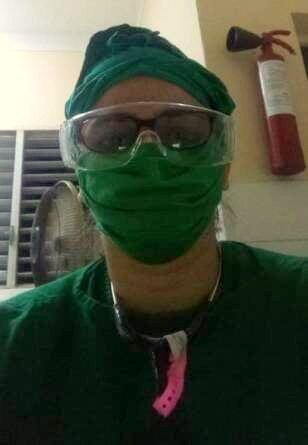
Beatriz Rodriguez Sandeliz is 30 years old. She is a First Grade Specialist in Pediatrics and head of the Respiratory Service of the Children’s Hospital “José Luis Miranda”, in Santa Clara, Villa Clara. Dr. Beatriz formed, in the beginning, together with Dr. Marbin Machado Díaz, also from the Children’s Hospital and Drs. Lissy Pérez Leal and Richard Godoy León, from the “Manuel Fajardo” Military Hospital, the team of eight pediatricians who, at present, attend to infants who are contacts, suspects or infected with the SARS-CoV-2 coronavirus.
“If they knew how hard it is to see a 12-year-old girl crying because her PCR has tested positive, we wouldn’t be so irresponsible and would stay home. It hurts to see a helpless child cry because we have not been consistent and have failed to protect those who are the hope of the world,” says this young doctor with only six years of training, three of them as a pediatrician.
(Texts and photos by Yudith María Delgado Rodríguez and Félix Alexis Correa Álvarez)

Let It Not Be Said

Let It Not Be Said
By Manuel Calviño
March 21, 2020
Translated and edited by Walter Lippmann for CubaNews.
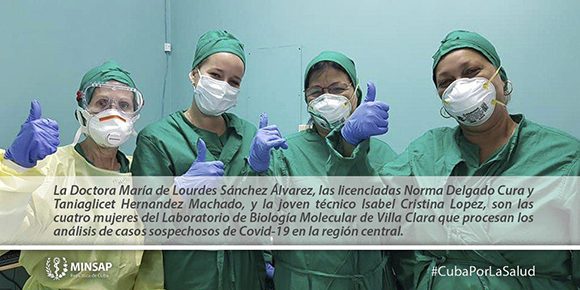
A hidden threat often triggers fear and anxiety on a personal level, in each of us. Knowing the possibly fatal effects of the threatening agent, multiplies the anguish and with it the tendency to seek solutions usually extreme and unlikely to be effective. If, in addition, these effects are visible, and they already affect others, then the cycle closes: perception of indiscriminate-risk increases the idea of vulnerability-uncertain resolution behavior. But even though it is known that in a pandemic situation, such as the one our planet is experiencing today, and our country is no exception, some are tempted to fall into the trap that distances them from appropriate behavior. There appear then, behaviors of neglect and denial (those that underestimate the situation, do not recognize it in its shocking reality, or hallucinate a certain invulnerability), and also behaviors that contain the necessary ones, but with a tendency to transcend them in excess, so much so that they can produce the opposite effect.
I believe that, in general, we have more in focus those who, due to an excess of confidence (personal and institutional), from an absolutely mistaken deduction (“nothing is going to happen here”, “I’m not going to be so unlucky”, and others similar), without taking into account the extra personal vulnerabilities. In other words, that is to say without the slightest perception of risk, ignore the essential measures of protection and care. I confess that some psychological traits make some more likely than others to build such an attitude. But nothing justifies or sustains it. We are what we are capable of doing with who we are. And that is how we build a better way of being.
But it is important to focus also on the other end of the bell of Gauss, that which describes what would be a normal distribution. Perhaps, by intensifying in order to attract attention, I mean those who hype-act the measures, with innovations of dubious value, moved from an excess of anxiety mobilization. When this happens, and the sense of basic care in the face of the pandemic is passed on, that which scientific knowledge dictates as essential actions, the way to face the situation seems to be helping us, but it may be harming us. Then, from a harmful mental disposition, any care seems little to us, and we can begin to produce not so careful care, which by its extreme nature, I insist, can be a generator of damage. Exaggerating is a common way of falling into what is being avoided.
Pandemics, in any of their forms, but the more aggressive they are, the worse they tend to promote among some people the idea, and not just the idea, but the deep belief, that along with the essential isolation of suspected and already victimized cases, the best thing is the total absence of links with everything around them. What, without a doubt, if this were the case, would have to be undertaken with supreme responsibility and at the right time. I therefore share a vigilance and a just and legitimate concern in this direction. A concern that is not stubborn and excessive, but constructive and sustained. In any case, legitimate, understandable and with the right to speak. Because only by talking will it be productive.
But I would like to refer to that action that implies having the unreasonable certainty that the enemy is anywhere, or rather everywhere, and that we have to find a hiding place at any cost and at any price. And I am not talking about the care and limitation of direct physical contact, which is usually one of the causes of the epidemic’s spread, but about the spiritual, identity-based sustenance of the forms of expression of human values. It would seem that for some people limiting behavior is synonymous with limiting, invalidating, the values they contain.
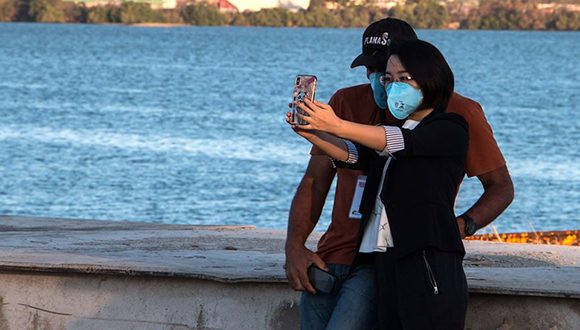
In bad weather, a good face. Photo: Abel Padrón Padilla/Cubadebate.
Let’s think about the challenge of distance. As a way to substantially cut the chain of transmission, scientists and professionals from many parts confirm the need to maintain a certain distance, they call for so-called social distance. What does this mean? In operational terms, maintaining a social distance means: not being in places where many people are, staying away from crowds of people; keeping a distance of about two meters from other people; not touching other people. Perhaps it is better to talk about physical interpersonal distance, to show that it is proposed to considerably limit physical contact, since it is one of the most powerful causes of the spread of the disease. Then, it is clear that shaking hands, hugging, kissing, these expressions of affection, love, friendship, companionship, tend to be substantially avoided in the current conditions of a pandemic.
But distance is not necessarily a problem. The problem is always separation. With you in the distance, it is not only a beautiful poetic phrase, but also an ethical attitude, a human relationship. García Márquez confirms it: “Distance is not a problem. The problem is the humans, who do not know how to love without touching, without seeing, or without hearing…” Ernesto Lecuona, in his beautiful Always in My Heart, convinces when he says that “nothing should be able to stop me from loving you”. The essence, is the essence, no matter how many different ways it is expressed. The essence of expressions of affection lies in the feelings and values that motivate them, and these can be lived, expressed and shared in many more ways.
Limiting is essential. But it is not necessary to limit, on the contrary, it is necessary to multiply, that spiritual, valuable substantiality that is expressed in this way. I am talking about the challenge of making the kiss, the embrace, the handshake felt, where it should not be physically realized. We know, paraphrasing Galeano now: good and authentic human feelings and values cannot be silenced. If they are not expressed in one way, it will be in another. But they cannot not communicate, they cannot stop interacting, co-living. To silence them would be to spread the maleficence of the pandemic.
The same goes for collaboration, solidarity, interpersonal relations, willingness to help and support. The axiom “all for one and one for all” applies, with undoubtedly different expressions, to these moments of indispensable precautions, but which cannot undermine the human essence. What we can achieve will always be more, and more forceful, if we do it together. That, on pain of being accused of being super-optimistic, is to emerge strengthened, resilient, from such violent and destructive adversity. That is, to take charge of an intelligent optimism.
A pandemic is not just a health, scientific, and political challenge. It is also, and above all from my professional perspective, an attitudinal challenge. It is our attitudes that protect us. It is they that get us through the situation. It is they who ensure that among the foreseeable consequences, there are also achievable conquests, just as “among the thorns, flowers are born”.
I defend, summon and fight for the self-care of each and every one of us. But, I need a self-care that implies, that includes the other (like a quantum reality, I could say some physicist). That self-care that knows how to take care of others, of ourselves. That which is not only personal responsibility, but human responsibility. That which commits us to preserve, and also to nourish and cultivate, our human essence, our condition as human beings. I say this because I know it professionally and scientifically, and I believe it deeply, “if I did not believe, what would I be?
But since temptations exist, since the human mind gives for the good and the not so good (even the bad), gives for the earthly and the divine, then it is necessary to be attentive, and to refer to our personal essence as human beings. I say more, to our national being, to our identity, to our being Cuban [somos cubanos]. So, to focus on our light zones and not on the dark ones, on what makes us a country where everybody is a brother, a partner, a friend, where anybody throws a line at anybody, where if we solve everybody, if we are participative, proactive, and extroverted (sometimes to diffuse limits), we are recognized as good people. Like that neighbor in my neighborhood, whom I observed from my balcony, who suffered the denial of a handshake with a buddy on the corner, and with genuine acceptance commented:
Who’s going to change what we are, let alone a virus, however many crowns he has?” And separating himself two meters away he said to the other: “Hand or no hand, I love you, my sister. You are on my team.”
You have to be careful. You have to take care of yourself. You have to let yourself be taken care of. You have to take care of each other. And we must also preserve the Cuban soul. “Let it not be said, brother, let it not be said.”
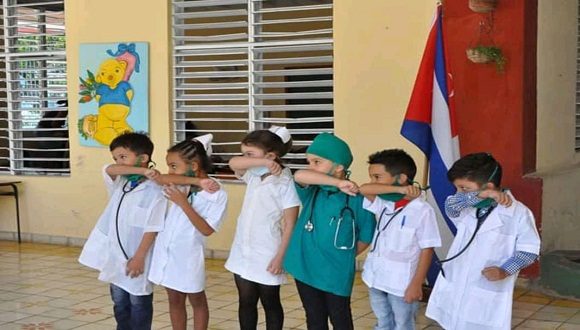
“Who’s going to change what we are, let alone a virus, however many crowns he has?” Photo: Rafael Martínez Arias/Facebook.
In China, the Battle Continues

In China, the Battle Continues
By Carlos Miguel Pereira Hernández
March 22, 2020
Translated and edited by Walter Lippmann for CubaNews.
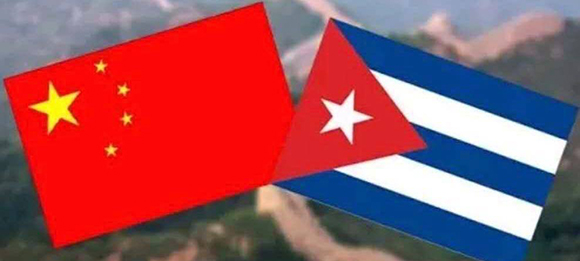
Image: Cuba’s Blog in China.
As you know, there has been encouraging news of the last few days in China indicating substantial progress towards controlling the spread of the virus at the mainland level. Together with the strengthening of quarantine measures in major cities to stop the upsurge of new cases “imported” from abroad, are reflected important changes in the scenario we have experienced in recent weeks.
While cities such as Wuhan and others, considered epicenters or areas most affected by the epidemic could move towards a gradual relaxation of the quarantine measures imposed, others such as Beijing and Shanghai will have to remain under strict mandatory quarantine measures for those arriving by air from abroad. This will involve adjustments to air routes, with previous stops in other cities and even changes in the planned destinations of international flights, as part of the measures taken to control the upsurge of new cases arriving from abroad. Only six new cases were reported in Beijing in this way.
The situation in Hong Kong, Taiwan, and Macao still remains complicated, although the trend of increasing new cases is also showing an encouraging slowdown.
As it is known, the situation of all our colleagues and relatives in China has remained unchanged and uneventful. This is largely thanks to the joint efforts of all and the discipline maintained in complying with the measures indicated. However, while the situation here is improving after two very critical months, in the rest of the world, including our country, it is tending to worsen and become more critical. That is why we must redouble our efforts so as not to compromise what has been achieved, to avoid complacency and, at the same time, to prepare for a gradual return to normality.
These have been intense days. In addition to taking care of ourselves and preserving the health of our collective to the maximum, it has been necessary to deploy an intense battle for the truth in our networks. [We want] to close the way to the lies and manipulation that have proven to be more contaminating and lethal viruses than COVID-19 itself. From our pages in different platforms, we responded to incredulous and manipulative people about the successful use of nebulized applications of Cuban interferon manufactured in the Changheber plant, both from the preventive point of view by the Chinese medical staff before attending the patients and in the treatment itself of the patients infected with the virus.
Just a few days ago, when we were in the midst of that other battle, in an inexplicable way, Facebook, based again on its questionable algorithms, surprisingly deleted the official page of our embassy, from which we had been informing the world in an objective and systematic way about what had happened in these long months of the epidemic, the situation of our compatriots and the work of the diplomatic mission and the consulates in the People’s Republic of China.
However, Cuba’s commitment to the truth can never be erased, not even with all the clicks in the world. Barely 24 hours later, a new page was created from which we have followed and will continue to disseminate to the world our bilateral work, as well as reiterating our support and recognition to the Chinese people and government. [In addition, there are such] humanist acts as the decision to receive the British cruise ship infected with COVID-19 in Cuban territory to enable its passengers to return to their countries of origin, or the decision by China and Cuba to send medical brigades and to strengthen international cooperation as the only effective way to win this battle for life.
Taking into account the evolution of the situation in China, the embassy, the consulates general of Shanghai and Guangzhou, the Cuban representative offices and the Antillean personnel on official missions will continue to implement planned measures, which take into account the persistence of the danger and the call for strict compliance with measures to avoid contagion, in the midst of a gradual return to normality.
The medical post will remain in operation at the embassy headquarters, with the services of the medical team that is among us. It will continue to support us in the important task of providing medical guidance and advice, and also in complying with the medical protocol established since the beginning of the epidemic. Given the current epidemiological conditions of our country, this acquires even greater importance in order to ensure that nationals traveling to our country strictly comply with it. The impeccable implementation of that protocol has enabled dozens of our compatriots to return to the country in good health and no cases of contagion from China have been reported so far.
As it has been reported through different channels, all Cubans who plan to return to the country in the next few days must also strictly comply with the indicated medical protocol, for which they must contact the corresponding consular office and the medical post.
On the other hand, taking into account the evolution of the situation and the gradual reestablishment of face-to-face work by the Chinese institutions, starting tomorrow, Monday, March 23, the Cuban embassy and consulates in China will begin to resume their work in person, which will be done in a flexible manner according to the situation in each locality and in coordination with the respective heads of offices and consulates according to the priorities to be undertaken.
In the case of the Embassy, the following measures will be mandatory:
The mandatory use of masks. Once you arrive at the parking lot and before entering the offices, have your temperature taken at the medical post.
Hands and shoes will be disinfected at the entrance of the Embassy.
No inter-office visits will be allowed and only those meetings duly authorized and coordinated by the embassy management and with the measures duly taken.
Do not use common glasses, cups or spoons. Each colleague must have and use his or her own.
Meetings with external personnel will be analyzed on a case-by-case basis and with due authorisation and will be carried out in strict compliance with the measures indicated.
It is necessary that the offices are kept clean and aired at least twice a day for 30 minutes each time.
The Consular Office in Beijing and the Consulates General in Shanghai and Guangzhou will continue to provide services as before. Secretaries may be incorporated as long as services are provided for which they are required and with strict compliance with all measures, including the use of nasobuco on a permanent basis. The consulates must permanently have all the resources to ensure prevention and timely disinfection.
In the case of the group of students studying at different Chinese higher education institutions, general compliance with these measures will continue to be observed, and they will have to be adapted to the characteristics of each university and the decisions that will be announced by the corresponding authorities for the current school year. For the time being, the Chinese authorities recommend that students abroad do not return to China until otherwise indicated.
To the resident Cuban community, we reiterate that the embassy and its consulates will remain as they have been up to now, open and in permanent communication with you, to assist and support you in whatever may be necessary. As soon as the situation allows it, we will meet to take stock of what has happened during these days, in which the unity and cohesion of all becomes the main possible and necessary path towards the future.
To all of you, no matter the task or mission that has brought you to China or the migratory status you have today, I reiterate, on behalf of the leadership of our Embassy, that it has been a true honor to have shared these difficult days with you. We have made real the permanent call of President Miguel Díaz-Canel Bermúdez to “think as a country”. At the same time, I congratulate you for the exemplary attitude that has been maintained, which is allowing us to arrive little by little at the goal and to contribute our share in the battle that is being fought. I am not exaggerating if I say that you have been up to the task of our always hardened people and also of the brotherly and stoic Chinese people.
Reciprocal solidarity between Chinese and Cubans has always been present in the common history of our peoples. There are many and countless pages written throughout these years, in which each party has spared no time or effort in supporting and reaching out to the other, in the midst of situations of disasters, epidemics, media campaigns, and unprecedented manifestations of hatred and economic warfare.
These have also been days of deep solidarity and mutual support. Cuba has not only been among the leading countries in supporting and recognizing the epic battle waged by China, which has also been a crusader for the world. But China has also provided its concrete contribution in solidarity in many ways. These include the joint work of experts who have joined forces in the development of new medicines or therapies to confront a disease that, beyond announcements and predictions, remains dangerously unknown. Likewise, Chinese and Cuban doctors are working side by side today to confront COVID-19 in the region of Lombardy, Italy, one of the most affected regions in that country.
More recently, after the appearance of the first cases of the new coronavirus in the country, we have felt the human and supportive accompaniment of the Chinese government and authorities. They were among the first again, as well as their people, their companies, institutions and friends in general, to whom we extend our deepest gratitude. Increasingly, they contact us from all parts of China to send us their encouragement and support and their confidence in the capacity of our country and its health system to face the COVID-19.
As has already been announced by the Chinese authorities, an important government donation is ready, which will be joined by others that will generously send Chinese companies with a long history of links with the Island, including equipment, inputs, and others of great practical value that will reinforce the proven capacity of the Cuban health system to act, always focused on preserving the life of the people. In addition, a modest donation is being prepared by the community of Cuban residents through the Association of Cuban Residents in China “Ernesto Che Guevara”.
The battle continues, there is still much to be done. COVID-19 constitutes a global threat that must be faced with the cooperation and responsibility of all. In its prevention and containment, solidarity and international cooperation is the only possible way.
Beijing, 22 March 2020
Does Panic Help in Pandemic Situations?

Covid-19:
Does Panic Help in Pandemic Situations?
By Danay Galletti Hernández
March 24, 2020
Translated and edited by Walter Lippmann for CubaNews.
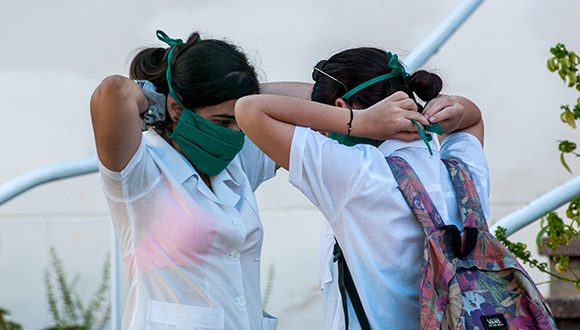
Medical students during the investigation of COVID-19. Photo: Abel Padrón Padilla/Cubadebate
Hysteria is as dangerous as social apathy, said Dr. Annia Duany, head of the Psychiatry Group at the Hospital Docente Clínico Quirúrgico Salvador Allende in Cuba, She said that confidence in the social measures taken in Cuba against COVID-19 is essential.
Panic does not help in pandemic situations and a favorable mood affects the prevention and treatment of diseases, Dr. Duany told Prensa Latina.
“It’s normal in this situation for people to experience nervousness, worry, anxiety and fear, but it’s essential to have positive coping resources. Examples being with family, seeking reliable and safe information, doing tasks and enriching our spiritual world,” he said.
On the other hand, Dr. Ana Sarracent, head of the Psychiatry Group at the Calixto Garcia Hospital, explained that although there is a risk of contagion at any age, epidemiological research indicates that those over 60 are more vulnerable to Covid-19.
“In these cases, family support is transcendental because they are more sensitive from the psychological and organic point of view. Also, extreme care and hygiene must be taken, as well as those with nervous or cognitive disorders, to ensure that they enjoy positive and happy materials,” she said.
The research work implemented to identify flu symptoms in the population and possible cases of the pandemic also reveals a significant number of adults who live alone and, therefore, need community support, Sarracent added.
They tend to have a hypochondriacal view of diseases and their situation of loneliness, as well as a diverse perception of the news broadcast on the subject, he said.
In coming days, numerous Cuban residents will arrive in the Caribbean nation and will be under isolation in response to a protection measure. The family, far from being distressed or depressed, must be aware and assume it in an appropriate manner, he said in reference to the most recent measures taken by the authorities.
About the children and how they should be treated in this context, Dr. Mabel Whilby, head of the Infant-Juvenile Group at the Pediatric Teaching Hospital of Cerro, Havana, explained that this sector of the population has different stages in psychological development and should receive information age appropriately.
The family must convey to the children that this situation will soon return to normal and then they will be able to play again with their friends, she said.
Children also have emotions, sadness and fears and must channel them, and at the same time, their parents must instill security and confidence in them through play, she added.
In this sense, conversations between adults cannot take place in front of children because they are too aware of the signs of how adults handle this situation, as they are patterns to imitate.
The specialists agreed on the importance of risk perception and insist that isolation and surveillance in homes be assumed with appropriate behavior: avoiding alcoholic beverages, smoking or neglecting eating habits.
Questions and rumors about COVID-19
Juan Padrón, Creator of Elpidio Valdés, Dies

Cuban Filmmaker Juan Padrón, Creator of Elpidio Valdés, Dies
March 24, 2020
Translated and edited by Walter Lippmann for CubaNews.
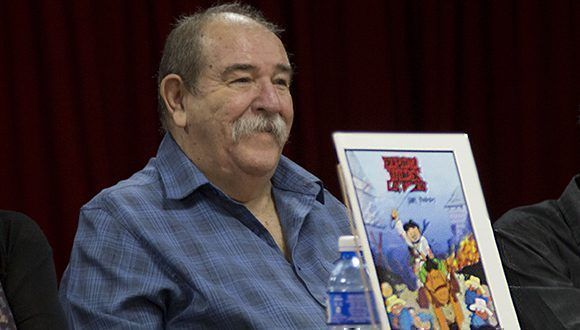
Juan Padrón. Photo: Ismael Francisco/ Cubadebate.
Cuban cartoonist, caricaturist and filmmaker Juan Padrón, creator of the legendary Elpidio Valdés cartoons, died on March 24 after being hospitalized for almost a month.
His son, Ian Padrón, announced the sad news on his Facebook profile.
Our beloved father Juan Padrón has just passed away at 5.20 am today, March 24, 2020. “The last mambí” struggled for 20 days and leaves full of love and tranquility. We thank all the doctors, friends and admirers who during these days have shown their affection and admiration for this great artist who is already part of the Cuban people and the independence of Cuba. Daddy, I know you would say “don’t get so serious”… and you are right. We will always remember you as the nicest, humblest, and coolest human being we will ever meet in our lives. Thank you for Elpidio Valdés, for the Vampires in Havana and above all for being such a noble and loving father and husband. So long, compay!
Juan Padrón’s biographical journey:
He was born in January 1947 in Central Carolina, in the province of Matanzas.
He graduated from the University of Havana with a degree in Art History (1978). Since 1973 he has been working at the ICAIC Animation Studies.
He has performed several functions as part of his artistic work, including comics and cinema. In 1963 he began his artistic career as a comedian in the weekly magazine “Mella”. He published comic strips and jokes in the supplements “El Sable”, “La Chicharra” and “Dedeté” of the newspaper “Juventud Rebelde”, where he created the series “Vampires”, “Zoo”, “Comejenes”, etc. In 1970 he creates the famous character Elpidio Valdés, who appears for the first time in the pages of the weekly magazine “Pionero” and who was later included in both series and animated films.
He has had an outstanding record within the realization of animated films. He has developed diverse functions, among which we can mention: script elaboration, scenographic and storyboard design, character design, animation, animation direction and voices. He has been a judge in national and international competitions.
He has worked as a film director of several animated films made with different techniques and duration. His titles include: Elpidio Valdés’ series, Filminutos, Quinoscopios, Mafalda and Más se perdió en Cuba; feature films such as “Una aventura de Elpidio Valdés”, “Elpidio Valdés contra dólar y cañón”, “Vampiros en La Habana”, “Mafalda”, “Más se perdió en Cuba”, “Más vampiros en La Habana”.
Among the recognitions obtained by his career and the works he has directed are
- Distinction for the Centenary of “The Golden Age”.
- CIFEG Award granted by that institution as recognition.
- National Film Award (2008).
- “Distinction for National Culture”,
- Alejo Carpentier Medal,
- The “Rubén Martínez Villena” and “El Diablo Cojuelo” awards,
- “Replica of Maximo Gomez’s Machete.”
- “Order Felix Varela”
- Space for the Work of Life” Award from the Cuban Association of Social Communicators of Cuba.
- “Viva papi!”: in 1982 he won Second Choral Prize. IV International Festival of New Latin American Cinema. Havana; in 1989, it was selected among the 30 best animation films by the Cultural Council of the Film Institute.
- “Elpidio Valdés against dollar and cannon”: in 1983 it won Second Choral Prize. V International Festival of New Latin American Cinema. Havana.
- “Vampires in Havana”: in 1985 it won Third Coral Prize. VII International Festival of the New Latin American Cinema. Havana. 1986: Diploma of Honor.
- “The mushroom festival”: in 1991, it won Second Choral Prize. XIII International Festival of the New Latin American Cinema. Havana.
- “More vampires in Havana”: in 2003, it won First Choral Prize. XXV International Festival of New Latin American Cinema. Havana.
- Three of his films are part of the collection of the Museum of Modern Art of New York.
Cuban President expresses condolences fover death of Juan Padrón
The President of the Republic of Cuba, Miguel Díaz-Canel, expressed through the social network Twitter, his condolences for the death of the outstanding filmmaker and cartoonist Juan Padrón, due to a serious lung disease.
Juan Padrón, father of our beloved Elpidio Valdés, genius and figure of the Cuban mambisado in such an authentic animation that it became real to us. Our condolences to family and friends, wrote the Cuban leader.
Díaz-Canel referred to Padrón as the creator of a brilliant and inseparable artistic work of Cuba, for being insurrectionist, for being a mambisa, for being a patriot.
Prince Charles Tests + for COVID-19

Prince Charles of England Tests Positive for COVID-19
March 25, 2020
Translated and edited by Walter Lippmann for CubaNews.

Prince Charles of England and his wife the Duchess of Cornwall on their visit to Havana in 2019. Photo: REX.
Prince Charles of England has tested positive for coronavirus, sources at Clarence House, his residence, confirmed.
The 71-year-old Prince of Wales “has shown some mild symptoms but otherwise remains in good health and has been working from home in recent days,” a spokesman for the British Royal House said.
His wife, Camilla Parker Bowles, Duchess of Cornwall, has also been tested for COVID-19, but she tested negative, the text added.
Sources at Clarence House said Charles and Camilla are currently in isolation at the royal residence of Balmoral in Scotland, adding that it was not possible to determine who infected the prince with the virus.
“It is not possible to determine from whom the prince contracted the virus due to the many commitments he made in his public role over the past few weeks,” the official statement from the Royal House said.
Queen in good health
Buckingham Palace, the official residence of Queen Elizabeth II, said the monarch last saw her son on March 12 and that “he is in good health.
The prince’s last public engagement was that same day, and he has been working from home ever since, according to official sources.
However, the Press Association news agency says the prince has had several private meetings with different people, who have already been informed.
According to the latest figures from the British Department of Health, there are currently more than 8,000 confirmed cases of coronavirus in the UK, but the number of cases is likely to be higher.
Of that number, 422 people have died from COVID-19.
Disinfecting Buses in Havana

Disinfecting Buses in Havana to Prevent COVID-19
By Ricardo López Hevia, Susana Antón Rodriguez
March 16, 2020
Translated and edited by Walter Lippmann for CubaNews.
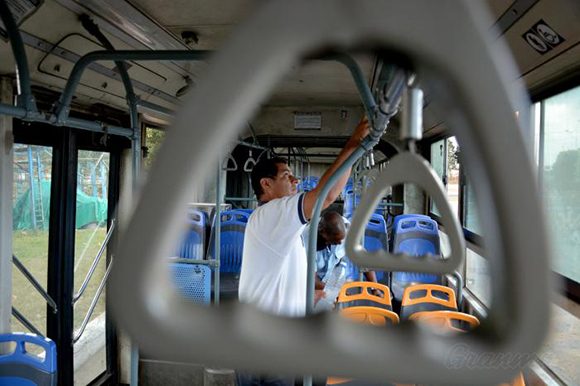
They disinfect the buses in Havana. Photo: Ricardo López Hevia/Granma.
In a city like Havana that moves an average of one million people a day by bus, any measure taken to combat the new coronavirus might seem like little.
However, the Ministry of Transport (Mitrans) has implemented a series of actions aimed at increasing sanitation and preventive control in the Provincial Transport Company, which is responsible for the articulated and rigid buses that participate in the daily transfer of the population in the capital.
The measures, which began last Tuesday, also include the work centers and the arrival of each worker to the base units, said Raimundo Hierro Luna, deputy director of human resources of the company.
The process is established so that, once the “bus” arrives at the terminal, a team begins with the disinfection with chlorine solutions of the handrails, seats, doors and other surfaces.
The departure times of the transport will not be affected, because also at peak times, between each departure of the buses, there are 15 minutes for cleaning, explained Mauricio Mató Hernández, director of the Mulgoba Terminal.
Each time a bus completes a journey, at the rest time before returning, these measures are also being applied, and the people responsible are the driver and the conductor, who carry out the cleaning with the means given to them.
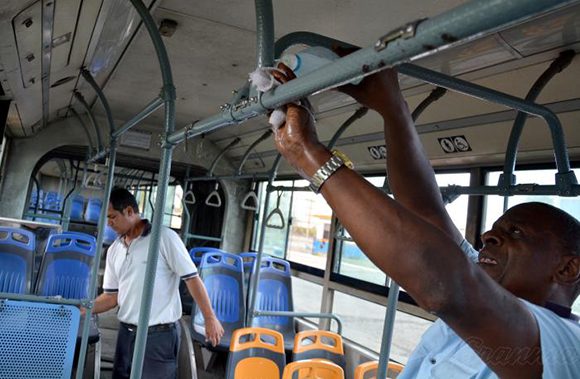
They disinfect the buses in Havana. Photo: Ricardo López Hevia/Granma.
Likewise, once the “cart” finishes the daily route and arrives at the base, a more meticulous cleaning is done to leave it ready for the next day.
The Provincial Transport Company of Havana has also published informative banners inside the buses, both rigid and articulated, so that the population is aware of the measures that must be adopted to prevent COVID-19.
This practice is implemented in each of the areas related to transport, such as the railways, the sea, and even aeronautics, as has been indicated to private transporters.
It is necessary to create a collective awareness of the importance of prevention, as each driver must be responsible for cleanliness and ensure compliance with the provisions of the COVID-19 confrontation in the Mitrans.
It is therefore up to the transporters to ensure the health of the Cuban people and to ensure, through hygiene and discipline, that all forms of transport are a guarantee of safety.
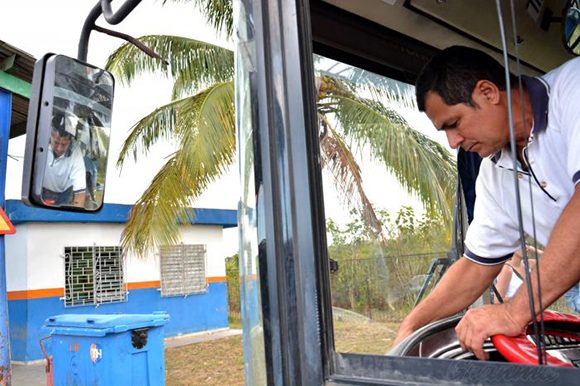
They disinfect the buses in Havana. Photo: Ricardo López Hevia/Granma.
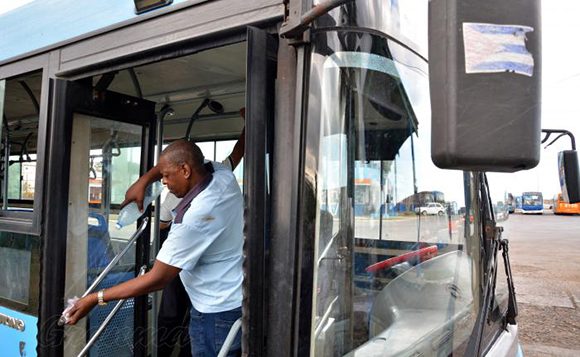
They disinfect the buses in Havana. Photo: Ricardo López Hevia/Granma.

They disinfect the buses in Havana. Photo: Ricardo López Hevia/Granma.
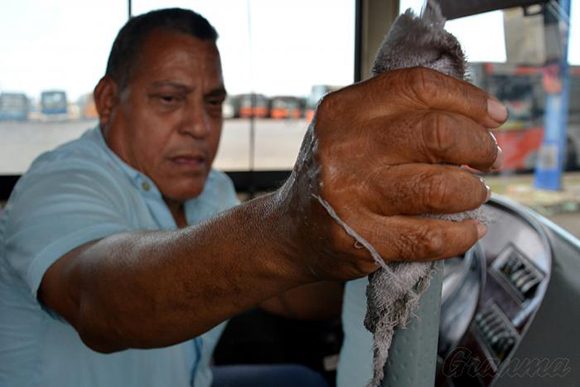
They disinfect the buses in Havana. Photo: Ricardo López Hevia/Granma.
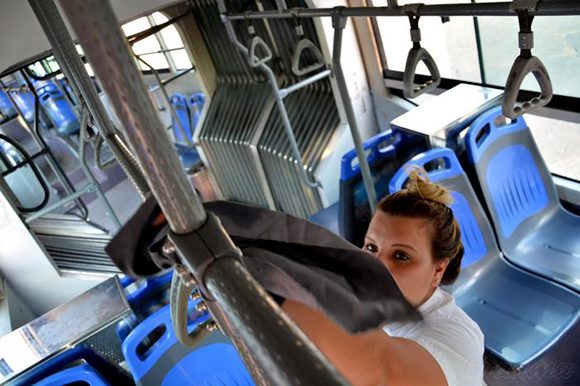
They disinfect the buses in Havana. Photo: Ricardo López Hevia/Granma.
Love in the Times of the Coronavirus

Love in the Times of the Coronavirus
By Carlos Lazo
Professor, creator of the Dream Factory project.
March 15, 2020
Translated and edited by Walter Lippmann for CubaNews.
This essay was originally posted to Facebook by its author.

We don’t want walls that separate us, but bridges that unite us. Photo: Carlos Lazo/Facebook.
Sisters and brothers who live in Cuba: we do not hate them. In fact, the vast majority of us Cubans who live in other countries love the Cubans who live in our land deeply. I often receive messages from compatriots on the island who ask me why the resentment of those who left against those who stayed is so strong. This question is supported, in part, by what they see on the Internet. Much of what is published on social networks is saturated with resentment and cruelty towards our people. But this is not the case. We Cubans who live abroad love and do not forget the family, friends and neighbors who live in our land. This relationship transcends ideologies.
But I understand why so many ask me the same question. There is a small part of the Cuban community abroad that exacerbates hatred and promotes punitive measures against our people. This group of brothers and sisters seeks to increase the pain of the Cuban family inside and outside of Cuba. Although reduced in number, they are complicit in the cruel restrictions implemented by the United States government that penalize Cubans here and there.
They devised and supported the cancellation of trips by U.S. airlines to airports in the interior of the island. They publicly advocated the prohibition of remittances from third countries to Cuba. They express it loudly; not only do they oppose the family contacts between the two shores, but they demand that the son who emigrated, stop helping the old mother who stayed on the Island. Some even speak of a naval blockade and even an invasion. Given this reality, it is logical that many Cubans inside Cuba have the perception that their compatriots outside Cuba want the holocaust of the Cuban people.
Right now, confronted with the global pandemic that the planet is suffering, several of those people have publicly expressed their desire for the coronavirus to wipe out the land of their birth. It is painful to see how they say it in public, on the social networks, jubilant and mocking in the face of the misfortune of others. Taking the containment of the virus as a justification, voices are heard that even advocate the total cancellation of flights between Cuba and the United States. Ironically, nations such as Brazil, Mexico, the Dominican Republic and others have already reported dozens of cases of the epidemic. However, nobody is asking for the closure of flights to those countries, but they are demanding the liquidation of trips between Miami and Havana! They have not been able to completely sever the ties between the Cuban family here and there and are now manipulating the fear of the epidemic to achieve their goals.
Compatriots of Cuba, for every brother who is confused or sick with a grudge, there are thousands of us who believe in love. We love the adopted country that one day received us with open arms, but we also love the motherland that gave us life. Instead of punitive measures that intensify suffering, we advocate cooperation between our nations. We do not want walls that separate us but bridges that unite us.
As for us; we are not a pack of wolves. As a people, we have a common destiny and a duty: to help each other in misfortune. But even if hatred were to rob us of our tenderness and turn us into a pack, we would still do anything to save our cubs, which are the Cuban children for whom we are responsible.
And if, in the worst case, an epidemic of oblivion were to strike us, if we were all to end up demoralized – those here and those there – orphans of humanity and transformed into wolves, even then, an ancestral instinct of homeland and love would rise up from our hearts to remind us of the unforgettable: that we are members of the same pack!

They have not been able to completely sever the ties between the Cuban family here and there and are now manipulating the fear of the epidemic to achieve their goals. Photo: Carlos Lazo/Facebook.
Subscribe to Blog via Email
| M | T | W | T | F | S | S |
|---|---|---|---|---|---|---|
| 1 | ||||||
| 2 | 3 | 4 | 5 | 6 | 7 | 8 |
| 9 | 10 | 11 | 12 | 13 | 14 | 15 |
| 16 | 17 | 18 | 19 | 20 | 21 | 22 |
| 23 | 24 | 25 | 26 | 27 | 28 | 29 |
| 30 | 31 | |||||

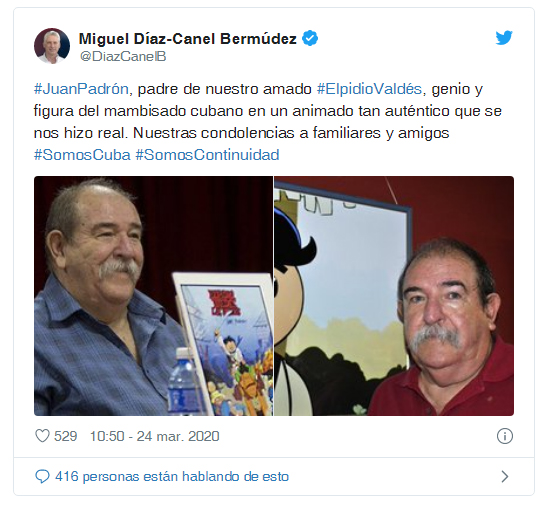
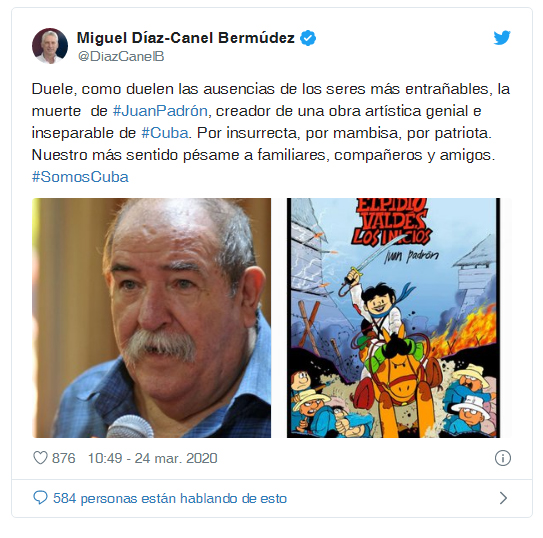
You must be logged in to post a comment.